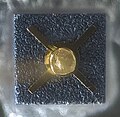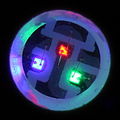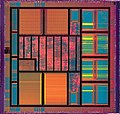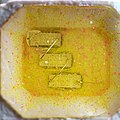Die (integrated circuit)
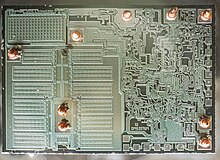
A die, in the context of integrated circuits, is a small block of semiconducting material on which a given functional circuit is fabricated. Typically, integrated circuits are produced in large batches on a single wafer of electronic-grade silicon (EGS) or other semiconductor (such as GaAs) through processes such as photolithography. The wafer is cut (diced) into many pieces, each containing one copy of the circuit. Each of these pieces is called a die.

There are three commonly used plural forms: dice, dies, and die.[1][2] To simplify handling and integration onto a printed circuit board, most dies are packaged in various forms.
Manufacturing process
Most dies are composed of silicon and used for integrated circuits. The process begins with the production of monocrystalline silicon ingots. These ingots are then sliced into disks with a diameter of up to 300 mm.[3][4]
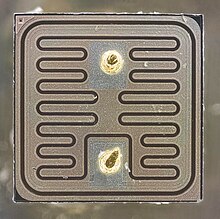
These wafers are then polished to a mirror finish before going through photolithography. In many steps the transistors are manufactured and connected with metal interconnect layers. These prepared wafers then go through wafer testing to test their functionality. The wafers are then sliced and sorted to filter out the faulty dies. Functional dies are then packaged and the completed integrated circuit is ready to be shipped.
Uses
A die can host many types of circuits. One common use case of an integrated circuit die is in the form of a Central Processing Unit (CPU). Through advances in modern technology, the size of the transistor within the die has shrunk exponentially, following Moore's Law. Other uses for dies can range from LED lighting to power semiconductor devices.
Images
Images of dies are commonly called die shots.
- Single NPN bipolar junction transistor die
- Die of an infrared receiver
- Close-up of an RGB light-emitting diode, showing the three individual dies
- A small-scale integrated-circuit die, with bond wires attached
- A VLSI integrated-circuit die
- Two dies bonded onto one chip carrier
- A monolithic IC operational amplifier
- 3 1/2 Digit Single Chip A/D Converter
- SN7400 Quad NAND gate in flat pack package. 1965.
- CD-ROM Drive head die
- An old security camera CCD sensor
- 1 watt 9 volt SMD LED.
- 6-volt 3-watt power LED. Wire bonds damaged in removing phosphor.
See also
References
- ^ John E. Ayers (2004). Digital Integrated Circuits. CRC Press. ISBN 0-8493-1951-X. Archived from the original on 2017-01-31.
- ^ Robert Allen Meyers (2000). Encyclopedia of Physical Science and Technology. Academic Press. ISBN 0-12-226930-6.
- ^ From Sand to Silicon “Making of a Chip” | Intel. (YouTube video, streamed on Nov 6, 2009)
- ^ From Sand to Silicon “Making of a Chip” Illustrations. (n.d.)
External links
- Wedge Bonding Process on YouTube – animation


